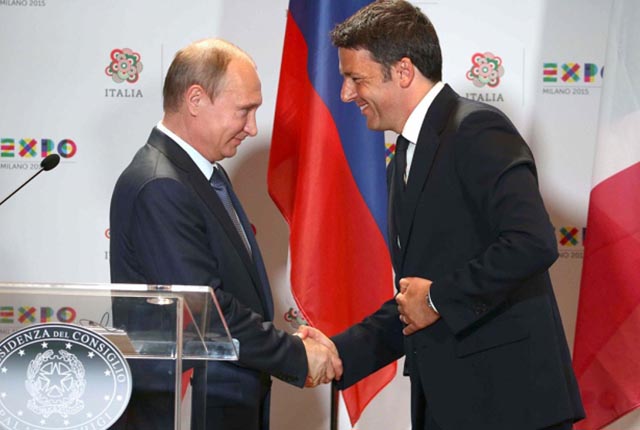Italy damps Ukraine
Putin's visit to Milan is the result of an intense lobbying activity on the Italian government. The public meetings with Russian President served only to repeat a mantra: the sanctions against Moscow hit both our economies and should be lifted. Thanks to an assiduous work of few influential people. Well, and Ukraine?
Italy has made her choice, and decided to take the side of Russia. No wonder. Our country is one of the most tight-fisted European countries in economic aid to Ukraine. A recent survey conducted by the Pew Research Centre among some NATO member countries showed that only 44% of Italians are in favor of economic aid to Ukraine, 37% welcome the country joining the EU and only 35% NATO. The lowest percentages of the whole survey. After all, the Italian Government is doing what its citizens want.
However, not only. Apart from the selfish indifference of the majority of Italians for the Ukrainian fate, there are strong powers tirelessly working for Europe to withdraw the economic sanctions on Russia.
Those who work against sanctions
There is a whole range of politicians, former politicians, businessmen and bankers paddling against the sanctions. Romano Prodi, Francesco Boccia (Pd), Gianluca Buonanno (MEP, Lega), Matteo Salvini, Giorgio Squinzi. But perhaps the most active of all is a name not among the best known. He is said to be the most powerful Italian in Moscow, a friend of Putin, Russian consul in Verona and founder of a think tank emblematically named “Knowing Eurasia”. Antonio Fallico is the president of Banca Intesa Russia, "ambassador" of Italian companies in Moscow, according to many he is the ''murky Italian intermediary" between Berlusconi and Putin, mentioned in a US diplomatic cable released by Wikileaks.
Fallico is working hard in these days. While Putin was visiting the Expo in Milan, he inaugurated a Russian-Italian seminar in Florence, where he said that "The answers to the geopolitical crisis can get by giving more space to the economy. We believe that the economy should force governments to recognize the true interests of the nations, for this must be overcome as soon as possible the setback imposed by sanctions and counter-sanctions". While in a few days, on June 19, at the International Forum in St. Petersburg will be held for the first time an entire session between Italy and Russia, always wanted by Phallic, with the goal of "strengthening trade relations between Italy and Russia." Romano Prodi, the Italian Ambassador Cesare Ragaglini, the head of Intesa Sanpaolo Carlo Messina, Mauro Moretti of Finmeccanica and Marco Tronchetti Provera of Pirelli will take part.
Rules of the common house
In short, those who think like Fallico, say: who cares of Crimea and the Donbass? Indeed, who cares of whole Ukraine, when are at stake the zillions of import-export between Italy and Russia, the gas trade and loads and loads of money? What else would mean "the economy should force governments to recognize the true interests of the nations"?
We should remind Fallico, who certainly know it, the two Greek words that blend into modern "economy", oikos, house, and nomos, rule. We should remind him that the interests of nations not always coincide with those of economic lobbies. That, indeed, they rely on the observance of international rules, the defense of the territory, well-being and safety of citizens, peace.
I have written several times as the "old" Europe approach is preferable to the hard confrontation wanted by Poland and Lithuania. Dalia Grybauskaite would already have declared war to Russia. It's madness. The system of selective sanctions is the right way to go, because calls Russia to account for its international policy, without closing to negotiation and dialogue. Putin’s visit to Italy is proof. On the other hand, the attempt of whitewashing is dangerous. Putin is looking for an exit strategy in Donbass and trying to make the world forget the theft of Crimea. With the help of Fallico, maybe he will.

Putin’s visit to Milan is the result of an intense lobbying activity on the Italian government. The public meetings with Russian President served only to repeat a mantra: the sanctions against Moscow hit both our economies and should be lifted. Thanks to an assiduous work of few influential people. Well, and Ukraine?
Italy has made her choice, and decided to take the side of Russia. No wonder. Our country is one of the most tight-fisted European countries in economic aid to Ukraine. A recent survey conducted by the Pew Research Centre among some NATO member countries showed that only 44% of Italians are in favor of economic aid to Ukraine, 37% welcome the country joining the EU and only 35% NATO. The lowest percentages of the whole survey. After all, the Italian Government is doing what its citizens want.
This content if for our subscribers
Subscribe for 1 year and gain unlimited access to all content on eastwest.eu plus both the digital and the hard copy of the geopolitical magazine
Gain 1 year of unlimited access to only the website and digital magazine



